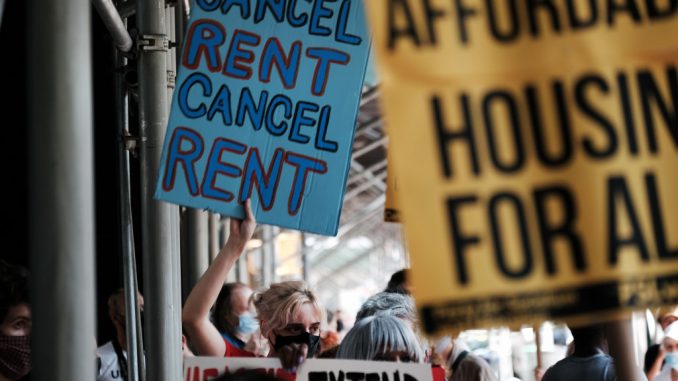

NEW YORK, NEW YORK – AUGUST 11: Activists hold a protest against evictions near City Hall on August 11, 2021 in New York City. (Spencer Platt/Getty Images)
OAN Newsroom
UPDATED 7:16 PM PT – Thursday, August 19, 2021
Many small landlords have sold their properties off to stem losses caused by the federal eviction moratorium, but they are selling to large conglomerates which could result in a more expensive market for rent. The Centers for Disease Control and Prevention recently extended the federal eviction moratorium to Oct. 3, when it was previously expected to expire at the beginning of August.
As a result, many landlords have struggled to afford their mortgages as renters have been essentially excused from paying rent.
“Well, without rent, we’re out of business. It’s like a restaurant that doesn’t have patrons. I don’t get the rent,” said Gary Zaremba, a landlord. “I can’t pay my maintenance staff. I have to lay them off. I can’t fix the buildings and keep them in good repair. So, that means they’re going to get even worse off. I can’t pay my taxes.”
Many landlords have pointed to the policy as a failure of leadership. “It’s poor public policy. It’s not good for anyone,” said Zaremba.
Due to the lack of payment, small landlords have been hit with thousands of dollars in losses, some even opting to leave units vacant to avoid the potential hassle of having to deal with more non-paying tenants.
Do not let the fake news distract you from the fact that the Biden Administration completely undermined the rule of law by extending the eviction moratorium.
— Madison Cawthorn (@CawthornforNC) August 18, 2021
Landlord Rick Martin cited the moratorium as the event which triggered his decision to sell two of his five rental properties. Since selling those properties, one has been turned into condos and the other had its monthly rent doubled.
Wealthy Wall Street firms have also taken to buying up family homes. Companies like Blackstone bought $5.1 billion worth of apartments in July. In June, Home Partners of America spent $6 billion and now owns more than 17,000 houses across the country to rent.
The result of big corporations buying up homes has been increased rent across the board, ultimately pushing small landlords onto the streets.





Be the first to comment